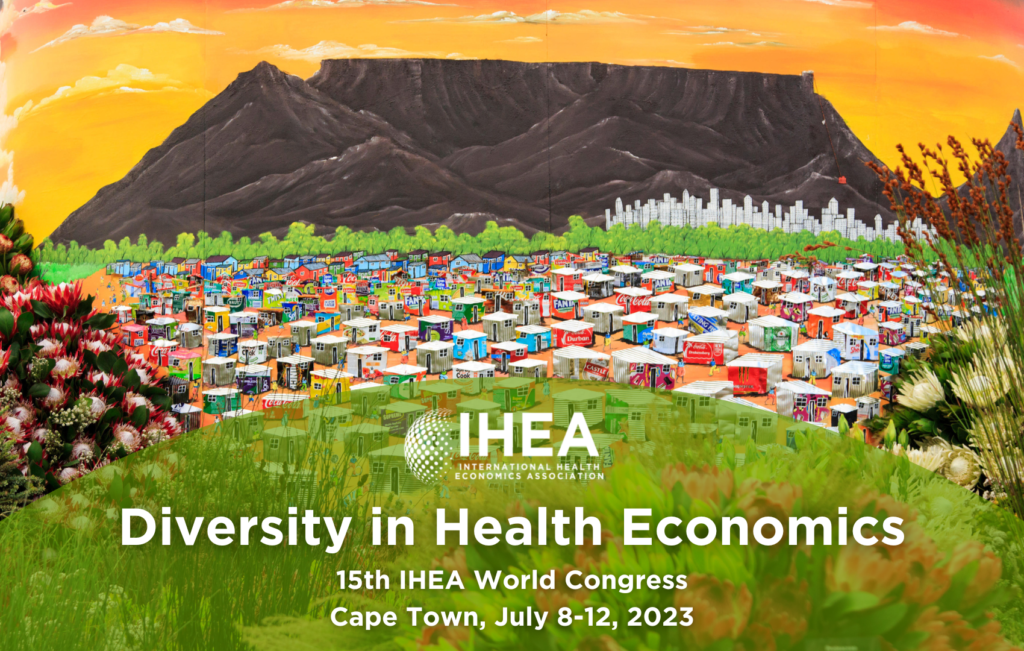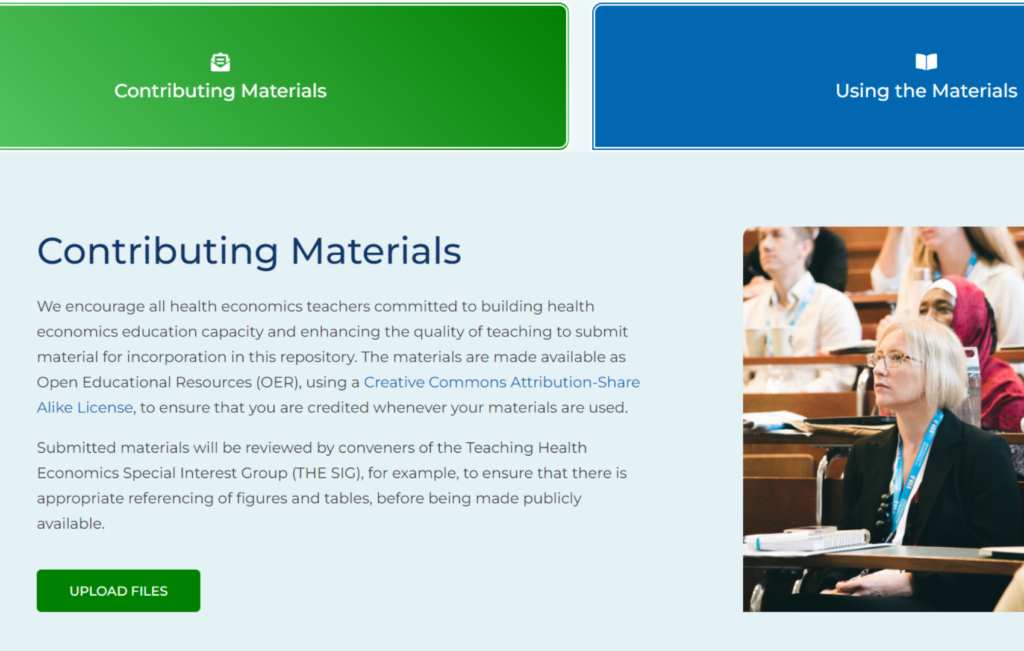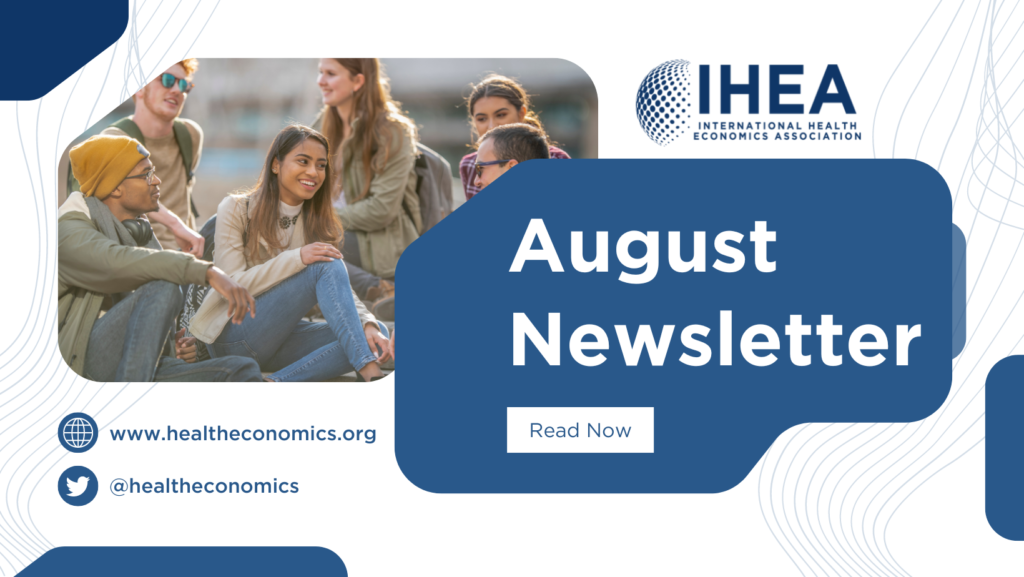To access a full version PDF of this newsletter, please click here.
Congress News

Abstract Submission System is Now Open
IHEA is pleased to invite you to join us in Cape Town in July 2023 for the 15th World Congress on Health Economics, which has the theme of Diversity in Health Economics. IHEA Congresses are well established as the forum to engage around the latest research findings in health economics from around the world, the implications of this research for health policy and practice, and new methodological developments in the discipline.
We would like to encourage health economists to make submissions in the form of an individual abstract or an organized session. Abstract submissions are due to open in early August and will close on November 29th, 2022. Submit your abstract here.
For any inquiries about the submission process please contact events@healtheconomics.org.
We look forward to having you participate in our congress in Cape Town next year.
Call for Expressions of Interest in Serving as an Abstract Reviewer
IHEA is currently seeking expressions of interest from experts in Health Economics to serve on the Review Panel of the Scientific Committee for the 2023 IHEA Congress.
We are looking for abstract reviewers with research expertise covering the full spectrum of fields within health economics. These broad fields are:
- Health, its distribution, and its valuation
- Health beyond health care services: social and related determinants
- Health beyond health care services: health behaviors
- Demand and utilization of health care services
- Supply and regulation of health care services and products
- Health care financing and expenditures
- Economic evaluation of health and care interventions
- Health system performance
- Cross-cutting themes and other issues
Full details of the sub-fields within each of these fields can be found here. Those expressing an interest in serving on the Review Panel will be requested to identify the primary field and several sub-fields in which they have the expertise, so you are encouraged to review the list of sub-fields before completing the application form.
While some of the members from the previous Scientific Committee will be returning for the 2023 Congress, the plan is to have a mixture of members with varying tenures to ensure continuity in the operations of the Scientific Committee while providing opportunities for all members to participate and contribute to the success of the IHEA Congresses. Review Panel members will normally serve for three consecutive Congresses.
IHEA would like to especially encourage mid-career researchers to express an interest in serving on the Scientific Committee Review Panel. Final decisions on membership of the panel will need to accommodate gender and geographic diversity as well as provide adequate coverage of the broad fields and sub-fields. Expressions of interest should be submitted online here.
Please note: If you served on the Scientific Committee for the 2021 congress, you should not complete this form; you will be contacted directly to find out if you are willing to continue serving on the Review Panel.
Expressions of interest for the Review Panel close on September 26, 2022.
Program to Support Early Career Researchers (ECRs) In Low- And Middle-Income Countries (LMICs) In Submitting Competitive Abstracts
IHEA will once again be offering support to early career researchers (ECRs) in low- and middle-income countries (LMICs) who do not have access to senior colleagues at their institution. LMIC ECRs can submit a draft abstract by late September. A team of established health economists will review each abstract and provide detailed feedback on how the abstract can be improved by late October, to allow researchers to finalize and submit their abstracts before the main submission deadline of November 29, 2022.
Those who would like to apply for such support should fulfill the following basic criteria:
- Must have graduated with their highest degree within the last five years;
- Must be a citizen of, and working or studying in, a LMIC; and
- The abstract must be on research undertaken in a LMIC.
As the purpose of this initiative is to provide support to LMIC ECRs who do not have access to senior collegial support, applicants should also fulfill the following criteria:
- If currently studying at a university in a high-income country, the abstract should not be for research that is being undertaken as part of their Masters or PhD for which they are receiving supervisory support;
- Be working in an institution that does not have senior health economics staff;
- The abstract should not have established health economists as co-authors.
Before drafting an abstract, please watch the recording of the webinar on “Successful Abstract Writing – Tips for the IHEA Congress”. This very helpful video recording is available in:
Abstracts should be a maximum of 500 words and should be submitted, and the application form completed, here by September 26, 2022.
LMIC ECRs who participate in the abstract support program, and whose abstract is selected by the Scientific Committee for presentation at the 2023 Congress, will be offered support in preparing their oral or poster presentation.
Call For Experienced Health Economists to Volunteer to Contribute Your Time to the LMIC ECR Abstract Support Program
If you are an experienced health economist, we are sure that you support your Masters and Doctoral students, and less experienced staff in your Department, by reviewing their draft conference abstracts and advising them on how to improve them. Many early career researchers (ECRs) in Low- and Middle-Income countries (LMICs) have no access to such senior collegial support.
If you are able to spare some time during October 2022, we would be most grateful if you would volunteer to assist in reviewing draft abstracts from LMIC ECRs and commenting on how they could be improved. Please volunteer by providing your contact details and indicating your major areas of research expertise here – please see a list of primary health economics research fields here.
Our New Website
Did you know…we have completely re-vamped our Teaching Materials Repository. ! It was a priority on our new site to make the Teaching Materials Repository as user-friendly as possible so everyone can access all of the great resources that already exist. In addition to being able to view and download the materials easily, you can also search by Health Economics Topic, Type of Material, Language and Author/Institution.
We encourage members to continue submitting resources to the repository here, so that we can continue to grow this amazing resource!

Mental Health Economics Special Interest Group – Social Hour
We are pleased to announce that the Mental Health Economics Special Interest Group is launching a series of themed virtual social hours for economists working in and/or interested in mental health. The aim of these social hours is to bring together people with similar interests and foster new networks. We will be running a short series of these happy hours over the 2022-2023 academic year, each of them lasting 60 minutes and providing the opportunity for large as well as small group discussion. (We will rotate the time of day to make this offering time zone inclusive.)
The first social hour will take place on September 20, 2022, at 1 pm CEST / 12 pm GMT / 7 am ET / 10 pm AEST via Zoom. It will be dedicated to getting to know the group and discussing how we can foster a network of economists interested in mental health. Please register for the event using this form.
Looking forward to seeing you on September 20!
Register Now: https://healtheconomics.org/event/mental-health-economics-special-interest-group-social-hour/
Upcoming Webinars
Prioritising Genomic Medicine
When: Tuesday, September 6, 2022, at 6:00 pm EDT
Presenters: Scott Grosse, Sarah Norris, Li Yang, Brock Schroeder
Description: Genomic medicine is rapidly changing the healthcare paradigm for multiple conditions, including cancer and rare diseases. With governments around the world increasingly investing in genomics research and implementation into clinical practice, and with the health economics evidence base on genomic medicine expanding, it is important to reflect on the role of health economics to change policy and clinical practice for genomic medicine.
Against this background, we are pleased to present the first symposium of the Economics of Genomics and Precision Medicine (Econ-Omics) SIG. The symposium will take place online between 1800-2015 EST on Tuesday 6th September and will consist of the following:
- an introduction (1800-1810)
- a panel discussion (1810-1925)
- a short break (1925-1930)
- then a workshop (1930-2015)
The symposium will begin by bringing together four experts for a panel discussion centred on the symposium title. The panelists are all specialists in health economics and genomics who will reflect on their experiences when generating health economic evidence across multiple jurisdictions for prioritising genomic medicine. Panelists will outline key challenges, critical elements for success when undertaking research in this space, and visions for the future.
A particular challenge is how to encourage and facilitate international collaborations going forward in this research space. The panel discussion will therefore be followed by a facilitated discussion in a workshop setting with early career researchers and researchers from low- and middle-income countries. The aim of this workshop is to ensure that the SIG takes forward high value activities for supporting capacity building in health economics of genomic medicine.
The Symposium will be facilitated by the conveners of the SIG. The four panelists will be:
- Scott Grosse, Centers for Disease Control and Prevention, USA
- Sarah Norris, Associate Professor, University of Sydney, Australia
- Li Yang, Associate Professor, Peking University, China
- Brock Schroeder, Vice President, Market Access, Illumina Inc., USA
Preferences for Adjuvant Immunotherapy in Resected Stage III Melanoma
When: Monday, September 12, 2022, at 6:00 PM EDT
Presenter: Ann Livingstone, University of Sydney
Description: Ann was recently awarded her PhD. She has a keen interest in patient preferences in trial-based and modelled economic evaluation. In addition, she works as an evaluator for the Australian Medical Services Advisory Committee, reviewing and critiquing evidence to inform government policy decision-making regarding health technologies.
Adjuvant immunotherapy has revolutionised the management of resectable melanoma, substantially reducing the chance of recurrence but at the risk of immune-related adverse events (AE). However, the choice of adjuvant (additional) treatments can be contentious.
A discrete choice experiment (DCE) included respondents with resected stage III melanoma considering or having received adjuvant immunotherapy. Respondents chose between twelve randomly presented choice tasks of two alternative options (adjuvant immunotherapy versus observation without adjuvant immunotherapy). The two options varied across two-three levels of six attributes: chance of 3-year melanoma recurrence, mild, permanent, or fatal AE, drug regimen, and out-of-pocket costs.
This presentation will discuss the results of respondents’ preferences for adjuvant immunotherapy as a treatment for stage III resected melanoma.
Financing PHC in LMICs: Putting People at the Centre
When: Tuesday, September 13, 2022, at 7:00 AM EDT
Presenters: Kara Hanson, Tim Powell-Jackson, Triin Habicht, Shankar Prinja
Description: In this webinar, we are going to present the findings from our Lancet Global Health Commission on Financing PHC report on two key issues: Resource Allocation and Provider Payment. We will also present two country case studies from India and Estonia to illustrate the problems and potential solutions.
Where Is Gender In Health Economics?
When: Wednesday, September 28, 2022, at 8:00-9:00 AM EDT.
Description: In this webinar we argue that gender equity has been relatively neglected in the field of health economics. This neglect has been to the detriment of building theory, research and health policy and programme implementation. We will illustrate our argument through specific application of gender analysis in selected areas of health economics including health financing, economic evaluation and access to health care. Through this webinar, we hope to stimulate and advance further thought, discussion and inquiry as well as encourage research and build the evidence across diverse settings on the topic of gender equity and health economics towards advancing gender equality and equity.
Save the Date
The Early Career Researchers SIG will be holding a webinar on the topic of identifying a research question at the rescheduled date and time of the 5th of October, 2pm UK time (add in other time zones here taking into account daylight savings changes)
This webinar will explore how to identify an appropriate research question. Choosing a research question can depend on topic, location, intended audience (universities, government, funders, industry), and whether the research question is for a PhD, or for a grant. Our speakers are from different parts of the world and have experience in conducting research for different audiences. Join us to learn how senior researchers go about identifying an appropriate research question.
A link for registration will be available for this webinar very soon.

